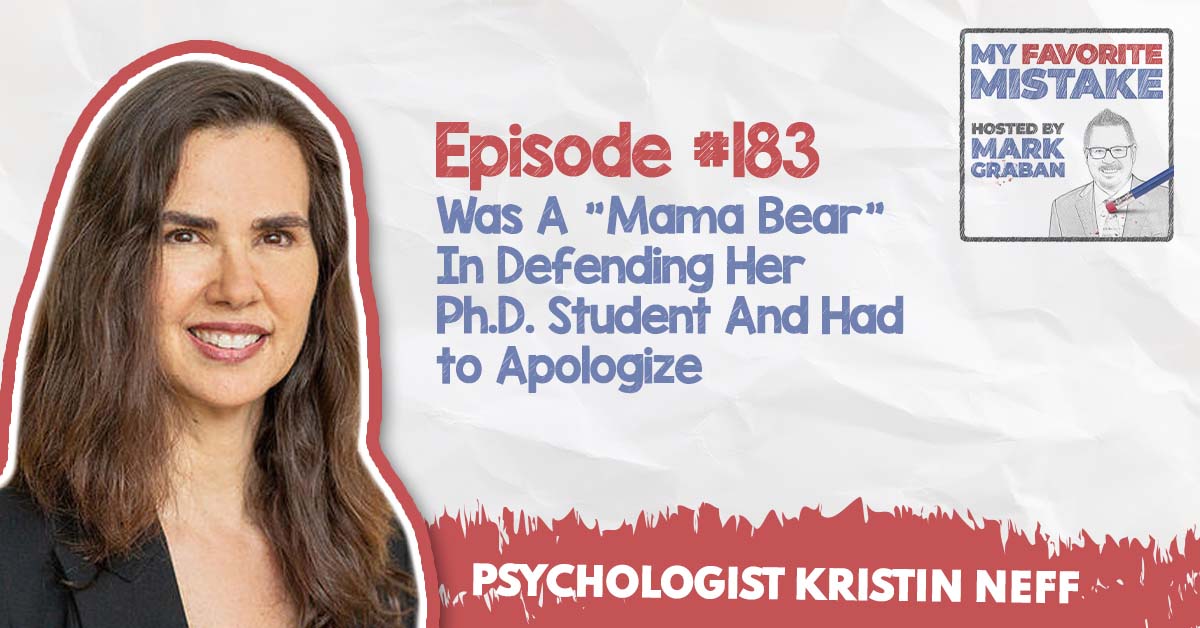Listen:
Check out all episodes on the My Favorite Mistake main page.
My guest for Episode #183 of the My Favorite Mistake podcast is psychologist Dr. Kristin Neff. She is the author of the books Self-Compassion: The Proven Power of Being Kind to Yourself, and the 2021 follow up book — Fierce Self-Compassion: How Women Can Harness Kindnkess to Speak Up, Claim Their Power and Thrive.
Kristin received her doctorate from the University of California at Berkeley and is currently an Associate Professor of Educational Psychology at the University of Texas at Austin. While doing her post-doctoral work she decided to conduct research on self-compassion – a central construct in Buddhist psychology and one that had not yet been examined empirically.
I learned about Kristin's work thanks to a mention of her by Dan Pink, my guest in Episode 137.
In this episode, Kristin tells her favorite mistake story about passionately defending one of her dissertation students who wasn't passed by a new assistant professor. Why was Kristin being a “mama bear” and why was she called on the carpet by her department chair? What did she learn from this experience and how did she apply “self-compassion” to herself in this instance?
Questions and Topics:
- Before talking about self-compassion, people might have mistaken definitions of compassion… how do you describe the true meaning of compassion toward others?
- HBR – self-compassion articles
- “Self-compassion vs. self-esteem”
- Finding the balance in acknowledging, reflecting, and learning vs. dwelling…
- “Having compassion also means that you offer understanding and kindness to others when they fail or make mistakes, rather than judging them harshly.” — can you share an example that illustrates that?
- How can we practice self-compassion when we realize we have made a mistake in our work?
- Important to soothe ourselves before reflecting on our mistake? How we might do that?
- Does it help us be self-compassionate when others are compassionate toward us when we make mistakes?
- What self-compassion is not — mistaken views?
- Self-Compassion free survey
Find Kristin on Social Media:
Watch the Full Episode:
Quotes
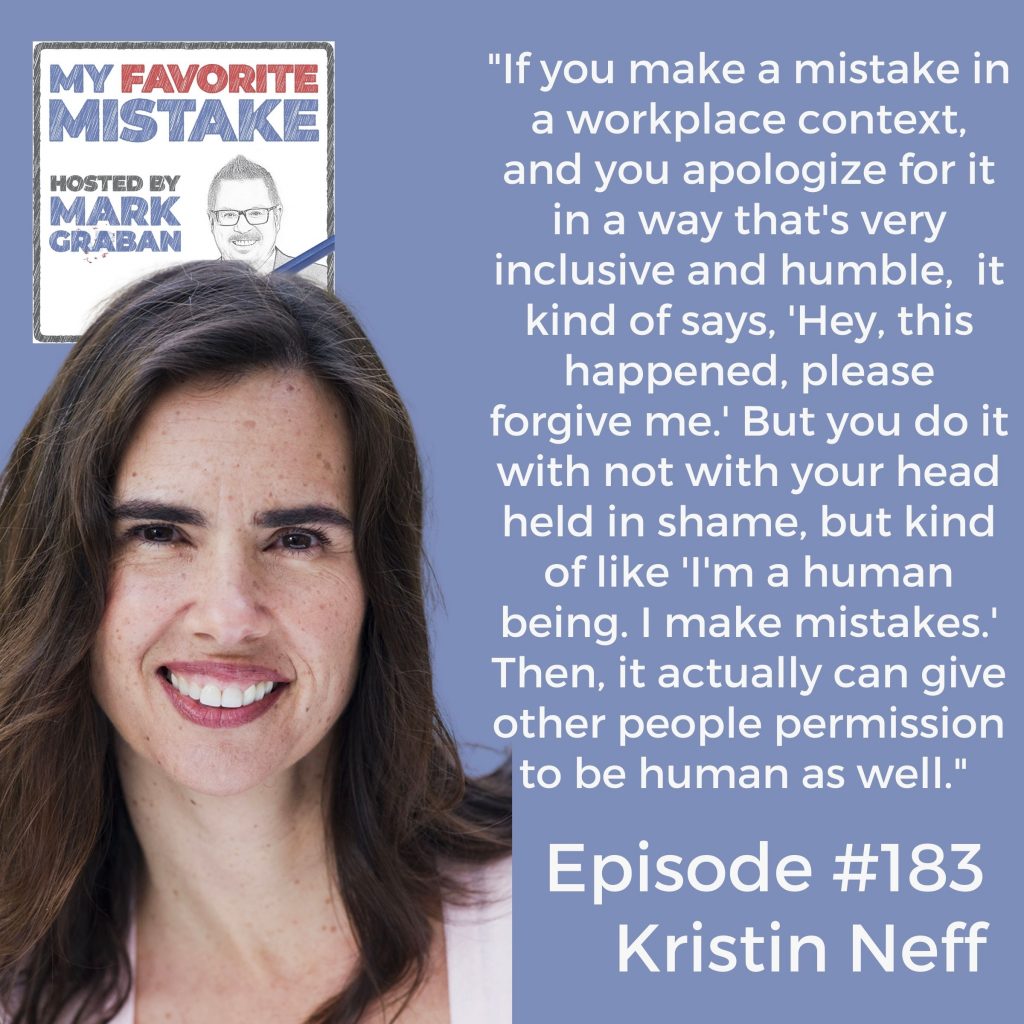
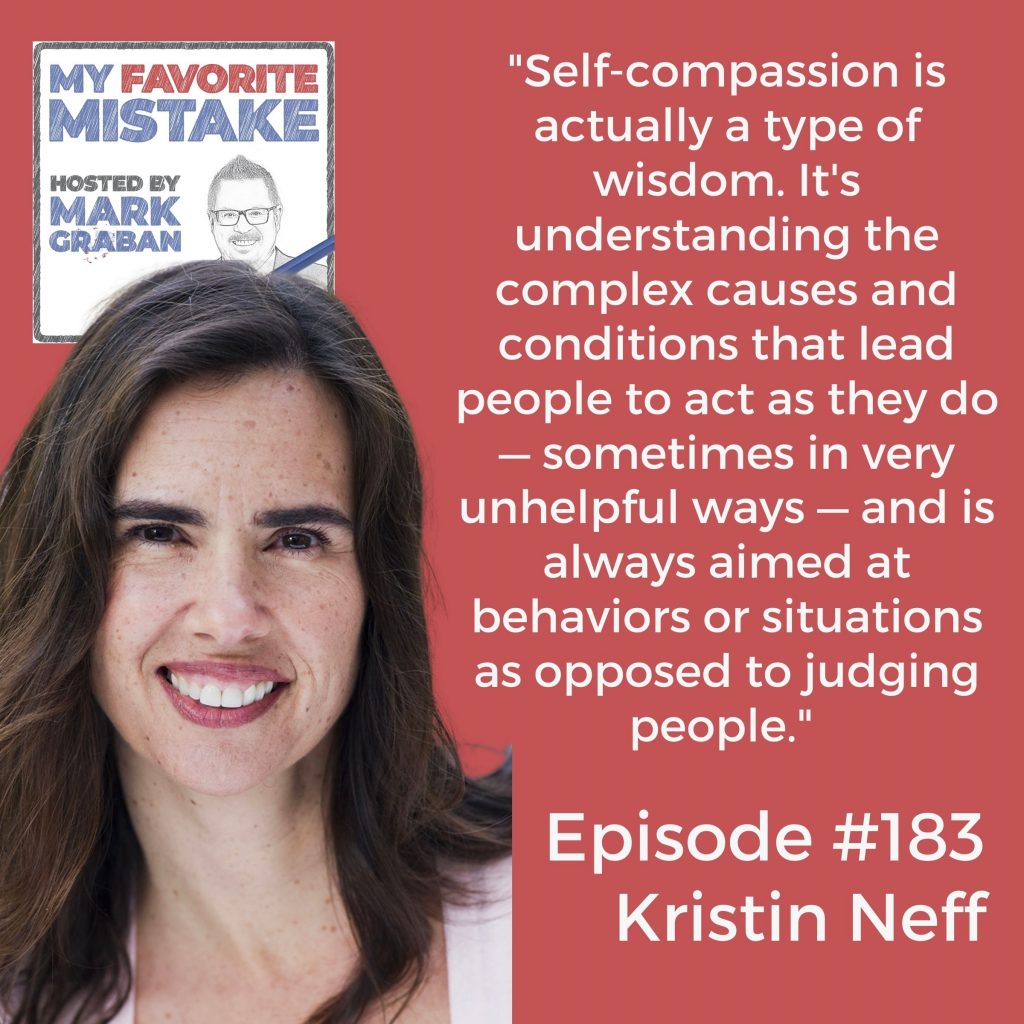
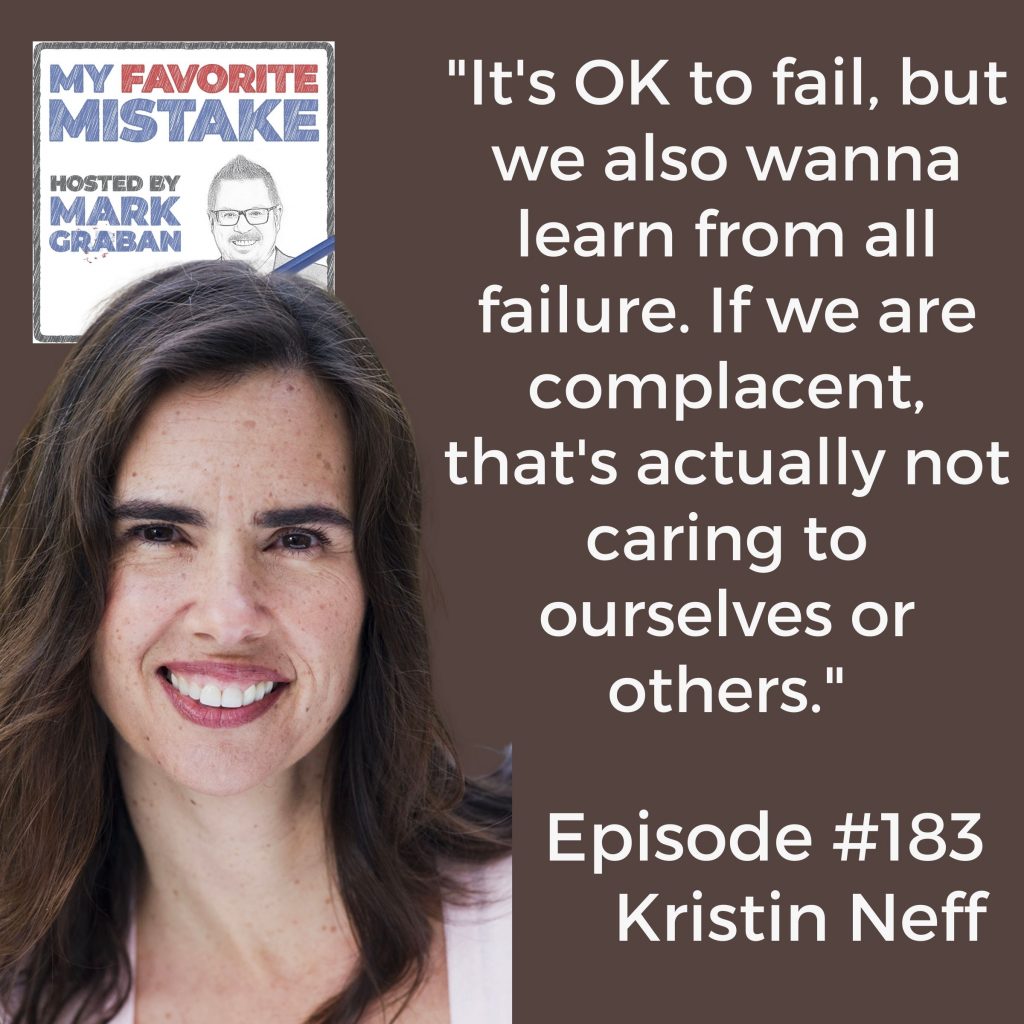
Subscribe, Follow, Support, Rate, and Review!
Please follow, rate, and review via Apple Podcasts or Podchaser or your favorite app — that helps others find this content and you'll be sure to get future episodes as they are released weekly. You can also become a financial supporter of the show through Anchor.fm.
You can now sign up to get new episodes via email, to make sure you don't miss an episode.
This podcast is part of the Lean Communicators network.

Other Ways to Subscribe or Follow — Apps & Email
Psychologist Kristin Neff Was A “Mama Bear” In Defending Her Ph.D. Student And Had to Apologize
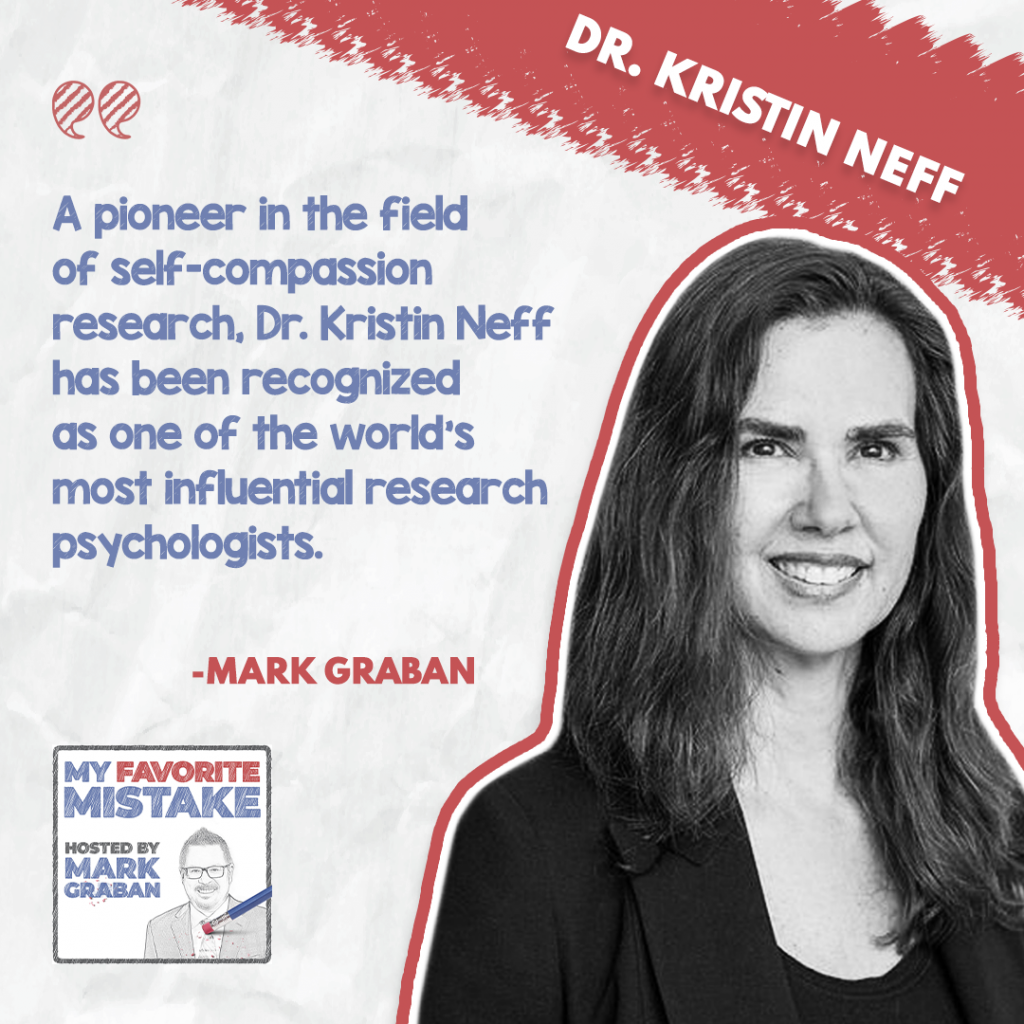
Our guest is Kristin Neff. She is the author of the books, Self-Compassion: The Proven Power Of Being Kind To Yourself, and the 2021 follow-up book, Fierce Self-Compassion: How Women Can Harness Kindness To Speak Up, Claim Their Power, And Thrive. Kristin received her Doctorate from the University of California at Berkeley and has been an Associate Professor of Educational Psychology at the University of Texas at Austin.
While doing her postdoc work, she decided to conduct research on self-compassion. It’s an important topic and theme for the show. It's an essential construct in Buddhist philosophy and one that had not yet been examined empirically. You can learn more about Kristin at Self-Compassion.org. Kristin also mentioned very glowing words by Daniel Pink in episode 137, the author of The Power Of Regrets. Kristin, thank you for joining us here. How are you?
I'm doing well. Thanks for having me.
Dan mentioned your work. It prompted me to dig deeper. I was reading your thoughts and work. I thought this was going to be helpful for the audience. Selfishly, it's going to be helpful for me personally. This is something I can work on here. I'm going to try to be compassionate about stumbling over the word associate. That's my recent most public mistake today. Before, we want to tap into your expertise and experience around self-compassion, we're going to do what we always do here. It’s the key question at hand. Thinking back to your work and your career, what would you say is your favorite mistake?
There are too many to recall. There’s one mistake I made, which I learned from and it was positive. It was not too long ago. I had a dissertation student. One of the members of her committee was a new assistant professor who I thought was critical of my dissertation student's proposal and was not in line with the department standard. I thought she was being too stringent. She didn't pass my dissertation student. Afterward, we were having a meeting with my dissertation student and this new assistant professor. I was pretty passionate about saying how I thought that there were some mistakes that may be needed to be rectified and that I thought maybe she was demanding too much.
I get an email from the department chair saying, “Kristin, would you mind coming in and speak to me for a moment?” Apparently, everyone in the hall could hear me talking to her. I didn't realize I was being so passionate that my voice was scaring her. I was a little more passionate than I had intended, especially for a new assistant professor. In other words, I got a little carried away in defense of my student. I was a mama bear.
The very next day we had our little department meeting. It is the area of our department. I went in and the first thing I said was, “I am so sorry.” I gave a public apology to her. I said, “I know the position of power. I shouldn't have raised my voice. I'm sorry if I scared you. If anyone in the hall felt uncomfortable, I apologize. I got too passionate and protective over my student. Please forgive me.”
Everyone look and was like, “Whoa.” They aren't used to someone being outwardly apologetic. First of all, it let the assistant professor off the hook because if someone more senior could make such a mistake and apologize, that gave her permission to make mistakes and apologize. Everyone has done it right. Everyone had those moments where you get a little too heated, a little too passionate, and maybe a little intimidating to people. We ended up having a nice discussion on the role of anger at work or what happens when we feel strongly about things.
In other words, it was a mistake but it turned out to be a learning experience. It's also linked to my book Fierce Self-Compassion because I wasn't being so much self-compassionate, but I was being protective. The fierceness was the protection of my dissertation student. Sometimes it's not combined with enough tenderness if it's not balanced. It can come off as scary or aggressive if people don't know where you're coming from.
It was at that time when I was also working on that book, and it was a good story for that. It’s one of the examples of you making a mistake in a workplace context, and you apologize for it in a way that's very inclusive and humble, and say, “This happened. Please forgive me.” You do it not with your head held in shame but like, “I'm a human being, I make mistakes.” It can give other people permission to be human as well.
[bctt tweet=”If you make a mistake in a workplace context and apologize in a way that’s inclusive and humble, it says, “This happened. Please forgive me.” Doing not with your head held in shame but like, “I’m a human being. I make mistakes,” gives other people permission to be human as well.” via=”no”]
There are lots of great points there. One is when you think about hierarchy in organizations, many guests here on the show have talked about leading by example. When leaders admit a mistake, that has positive effects on everybody else.
It was also a good learning for me because I don't think of myself as someone with power. I think I probably am because I'm fairly well-known. I had a slightly higher rank than her. That's also a thing like, “Kristin, you have to remember, compared to other people, you seem like you're someone with power.” I don't think of myself that way. It's also good learning for me that you don't take that into account sometimes when you should.
It’s the mistake of not taking that into account.
Her perception of me being passionate, she’s taking it as a frightening thing.
Did the word anger get thrown at you by the department chair or by somebody else?
People thought I was angry. I wasn't angry. I was very protective. In my book, I talk a lot about the need to balance fierceness with tenderness. If you're too fierce without some obvious caveats like saying that you understand. I could have couched it in a slightly different language and still been very firm. I did think she got it wrong in the dissertation proposal meeting. I could've couched it in ways that made her feel safe and not threatened.
That would've been the tender self-compassion. Anger does have a place. My book is about that. It has to be done in a balanced and human way. I will admit it, at that moment, I was thinking of my student as the human one, and this assistant professor as maybe not as human as she was in terms of reactions to things. Anger does have a role but it needs human respect for everyone, including the people who maybe are on the receiving end of your boundary.
What's an example of how you might have prefaced this feedback to the professor about being too stringent?
What I probably should have done first of all is what they call the sandwich method. I know this. I teach this to other teachers, but one forgets it. It started by acknowledging great insights, “I know you haven't been on that many dissertation proposals here. I love your enthusiasm and care for the topic, and your concern for my student getting it right.” It was a proposal for her actual dissertation.
I could then have said, “Given what's normal in this department, I feel personally that would've been a pass, but there's no way you could know that.” I should have made it more of a collaboration in terms of how we can work together to help the student. It probably came out more like, “I've been here for a long time. In my experience, people with a proposal this good would've passed.” It came out a little bit more like that if I'm totally honest.
It came across as, “You're wrong.”
“You're wrong. I'm right. and I'm not happy about it.” I'm going to give myself some compassion because it's embarrassing to realize that even with all our meditation experience or whatnot, especially when we're in that protective mode for someone we care about like this student. I thought she'd done a great job. It came out too strongly.
Thank you for being willing to share a story. It takes some vulnerability to share a story like that. I do try to honor and appreciate everybody for being willing to come on here and tell a story like that. I do my best to be compassionate toward my guests. It's okay. We all know and you may teach people that we all make mistakes. I'm wondering, through your study and experience, if you have a different view around the word mistake, whether that's run from Buddhism or other influences.
Unfortunately, my self-compassion practice hasn't kept me from making mistakes or even from getting angry. What it has done is immediately I was able to apologize. The second I realized it, I had no discomfort in publicly saying, “I made a mistake. I'm so sorry. Does anyone wants to talk to me about it?” That's what self-compassion gives you. It doesn't prevent you from making mistakes but it does make you do two things. First of all, being comfortable admitting your mistake and most importantly, learning from them.

I did unpack it afterward, “What could I have done differently?” I unpacked it with her and with my student. There's been a fair amount written about self-compassion in Harvard Business Review. What that paper gets is that self-compassion is the key factor that enables you to learn from your mistakes. If you're protecting your ego and you feel a lot of shame, “That was terrible. I don't even want to think about it. I don't even want to go there. I want to hide,” then you can't work through it. You can't learn from your mistakes.
If you don't admit the mistake, some people may fall into shame. Other people maybe like, “It’s her fault. What does she think about that upstart? I was within my rights to give her a dressing down.” You also don't learn from your mistake. You're leading me here. Is it a mistake or is it a learning experience?” It's a learning experience as long as you're willing to acknowledge it, give yourself an understanding, or maybe some of the factors that led to what happened. You can also see how those factors might play out differently next time, or what might you do differently in that situation so you do learn and don't get in that situation again.
It's called self-compassion, but it's not self-compassion at the expense of other compassion. All it is including yourself in the circle of compassion. Most of us are compassionate to others and not to ourselves. When we're self-compassionate, it means I'm also compassionate for my student, that young assistant professor, and myself. It's like 360-degree compassion. When compassion flows in every direction, then it allows you to see more clearly and come up with better solutions. Hopefully, it’s a win-win solution and helps everyone.
Part of self-compassion is recognizing the difference between saying, “I was rude to that person. I did something rude. I did something that was perceived as rude,” as opposed to saying, “I'm a rude person. I'm an awful person.” There's a difference there.
What you are pointing to here is what I like to call the difference between self-compassion and self-esteem. Self-esteem is a global evaluation of worth, “I'm a good person or I'm a bad person. I’m a nice person or I’m a rude person.” It's focused on an evaluation of the self. Compassion is the type of wisdom. It's understanding the complex causes and conditions that lead people to act as they do sometimes in very unhelpful ways. It is always aimed at behaviors or situations as opposed to judging people.
[bctt tweet=”Self-compassion is a type of wisdom. It's understanding the complex causes and conditions that lead people to act as they do – sometimes in very unhelpful ways – and is always aimed at behaviors or situations as opposed to judging people.” via=”no”]
I can still be a worthy person even with my behavior. It's true in that meeting. My behavior wasn't acceptable. It was a mistake. I should have approached it differently. Just because my behavior wasn't good doesn't mean that I'm not good. It is unconditional self-acceptance at the same time we don't accept our behaviors or situations.
We could have high self-esteem and maybe anchor it in terms of I would like to think I'm a kind and patient person, therefore I can distinguish from, “That was a bad moment. What triggered me? What were some of the factors that led me to maybe not be able to contain my frustrations?”
It's not so much high self-esteem as it is unconditional self-esteem. You can have high self-esteem predicated on the belief that you're a kind person, then when you act unkindly like I wasn't being kind at that moment, your self-esteem takes a hit. Whereas if it's unconditional, my self-worth doesn't come from being a kind person or an unkind person. It comes from being a human being.
Therefore, when I have moments that I'm unkind, it doesn't impact my worth, just as when I have moments when I am kind, it doesn't impact my worth either. My worth is separate from my behavior. The behavior is you want to behave well so that you don't cause yourself or others suffering, but it's not contingent. What the research shows is that the sense of worth that comes from self-compassion is much more stable over time. It's there when you succeed and when you fail. It's there no matter if people like you or don't like you. It's a very stable sense of self-worth where self-esteem can bounce up and down like a ping pong ball, depending on whether you have a good day or not.
There's one other follow-up I wanted to ask you. You talk about acknowledging, reflecting, and learning. How do we find the balance between reflecting and dwelling on a mistake or beating ourselves up? At what point do you decide to let go and move forward?
With self-compassion, you don't beat yourself up. You might use constructive criticism. Beating yourself up is personal, “I am bad. I'm a bad person.” Constructive criticism is, “When you used that tone of voice, she was scared. Your student was scared. It wasn't very effective. It didn't help.” When you've learned the lesson is when you move on. When you beat yourself up, it ironically prevents you from learning the lesson. When it's about, “I'm such a bad person. Who am I to call myself a professor?” All that prevents you from learning the lesson.
The goal of practice is simply to be a compassionate mess. In other words, there is no end game where you're not going to be a mess or you're going to learn everything. You've learned it all, and now you don't make mistakes. You got your stuff together. That point never arrives. You'll always be a mess because you're human, but you can be a compassionate mess, which means when you do make a mistake very quickly, “I may maybe need to apologize and rectify something.” It's much easier to move on because it's a process as opposed to some goal or endpoint.
When we're reacting to a mistake that we've made, whether it is behavioral or we do something wrong in the course of our work, can you talk about the role of soothing ourselves before reflecting, and how we might do that?
There are two sides to self-compassion. I briefly alluded to it, which I like to call tender and fierce. One is about acceptance. That's the warm and soothing quality of compassion. It might be like a parent with a crying child. You hold your child and they start to calm down. That's the warmth and unconditional acceptance part piece of self-compassion. It's not only ourselves but it's also our emotions, “It's okay. I'm here for you. You're upset.” That's the accepting energy. You can accept yourself, but not all the situations you're in or your behaviors. That's what I call Fear Self-Compassion. I talk about situations because sometimes, especially in a workplace context, the most self-compassionate thing might be to speak up or to draw a boundary.
Maybe a coworker is not doing their fair share and asking too much of you. You might say that situation is not okay. Maybe you are in a toxic work environment and you need to make a change in some way. That's the fear side. That's the action-oriented side of self-compassion. We accept ourselves at the same time that we take whatever actions are needed in the world to alleviate our suffering and flourish.
You can do them simultaneously. You can take action in the world at the same time that you're soothing and accepting yourself. If it's just about soothing and accepting yourself, and not taking needed action, that's not compassionate. As a parent, you may still love your child if they aren't potty trained at age four, but you aren't being compassionate to your kid because your kid needs to learn how to use the toilet. You can love your kid. At the same time, you say, “No, you need to learn this skill even if it's difficult, challenging, or uncomfortable.”
As people are learning about self-compassion, myself included, and trying to practice self-compassion, one thing you've written about is some of the mistakes we might make and our understanding of our practice of self-compassion. What are a couple of common ones?
The biggest one is related to what we've talked about. The biggest barrier to self-compassion is people think it's going to undermine their motivation, and that it's going to make them complacent. It's the opposite because when you have compassion for your failures or your setbacks, it makes you more able to learn from them. If you shame yourself for your failure or setbacks, first of all, it creates anxiety. Performance anxiety often makes it harder for you to achieve.
[bctt tweet=”It’s okay to fail, but we also want to learn from all the failures. If we are complacent, that’s actually not caring for ourselves or others.” via=”no”]
For instance, we taught self-compassion to high-level athletes called NCAA athletes, and their performance improved because when you're less anxious about making mistakes, you can be more at the top of your game. It's easier to get into the flow. You maintain your sense of self-confidence, “Because I blew the shot doesn't mean I'm a bad player.” That's a mistake about self-compassion. It is a more effective motivator than self-criticism.
Self-criticism works the way you’re yelling at your kids' work. You get compliance but you also get these negative knock-on side effects. It’s the same thing with ourselves. It's more effective to be constructive and helpful. Another mistake is people think it's selfish, “If I'm compassionate to myself, I'm going to be less compassionate to others.” It doesn't work that way. It's additive. The more compassion you give to yourself, the more resources you have available to give and sustain giving compassion to others.

Another mistake to confuse you with is self-pity. Self-pity is woe is me. It's self-focused. Self-compassion isn't self-focused. It's like, “This is the human condition.” You might say, “Everyone is imperfect.” It creates more connection with others as opposed to being self-focused. It's quite different than self-pity. It’s like woe is the human condition. We're all in the same boat. We're all doing the best we can.
I don't know how much you're into sports personally, but I've had a few high-level athletes on the show, people who had played in the National Football League and National Hockey League. Mistakes in the world of sports are often very public. Millions of people see your mistake. We bring it back to compassion. When you see a player drop a punt that could have lost the game for the team, it's heartwarming to see teammates come up and console the player.
You can see some sense of compassion, which you might not expect to see in the middle of a violent game. The question I wanted to turn back to you in a roundabout way is this. What's the connection between others being compassionate toward us and our own ability to be self-compassionate? It seems like what you were saying is it's additive.
Certainly, it helps. If you had compassionate parents, for instance, as opposed to very critical parents, it's easier to be self-compassionate. If you have compassionate friends or family members, it makes it easier to be compassionate. Having said that, sometimes, people don't let in compassion for others. Some people who are self-critical or have a lot of shame reject the compassion of others, or it makes them uncomfortable. For some people, it feels more comfortable to be flat on the floor. They can't fall any lower if they're already criticizing themselves. If someone forgives them, it's almost scary because it might mean that they would like to pick themselves up and they could fall down again.
There are a lot of family dynamics and psychology that go into why it's hard for people to be self-compassionate. It's a whole other talk. The nice thing about self-compassion is that it's not dependent on others. It helps if you do have compassionate others. If you don't or for some reason, maybe your partner or your friends are busy, or they don't have it in them to give it right now, you can give it to yourself. It's ultimately a form of self-reliance. It's a type of reliance and independence. It's a very powerful form of resilience.
This is another story. We found that combat veterans are more self-compassionate about all the trauma they experienced. They are much less likely to develop PTSD. They're less likely to turn to alcohol to deal with the pain of the trauma they experience. They are much stronger and able to get through. They have stuff that will have your own back. It's great if you've got your allies with you, but if you're an enemy to yourself, you're undermining your own ability to succeed. If you're an ally to yourself in addition to others, that's going to make you that much stronger.
That's powerful. It goes to show how this is transferable across different domains. You used the word compliance a couple of minutes ago. There are many leadership behaviors in different workplaces. I've been subjected to it or a victim of it, especially early in my career. These behaviors of blaming, yelling, or shaming others are effective in creating poor performance and a dysfunctional culture. It seems like the worst thing a leader could do is compound somebody's mistake by getting angry. A leader who struggles with self-compassion is that leader more likely to be compassionate toward others when they make a mistake.
They don't necessarily go hand in hand simply because there are people who are compassionate to others, but not compassionate to themselves. In research, what we find is when people are self-compassionate, they tend to be compassionate to others. Also, when people are not self-compassionate, they're often compassionate to others. Most people operate independently, but it's almost never the case for people who are self-compassionate and not compassionate to others.
We do have research on people who respect self-compassionate leaders more. Maybe you make a mistake and you say, “I'm such an idiot,” hoping people won't be mad at you. People don't respect that. If you don't acknowledge it, people don't respect that either. In other words, it’s like I did. I acknowledge my mistake, but I didn't shame myself. It's like, “I'm sorry this happened.” If you treat yourself with respect as a human being as you acknowledge your mistake, they found that workers respect that more in leaders than leaders who either are not compassionate or beat themselves up. It is less likely to happen from your bosses to beat themselves up publicly. Higher self-compassion is linked to more respect from the people you lead.
I'm thinking back to a game. It was Louisiana State, LSU. The player dropped the punt. It could have lost them the game. It didn't lose them the game, but there was that compassion on the field. The one thing I noticed after the game was that the head coach, Brian Kelly, was very critical of the player. You'd almost say that he’s throwing him under the bus and making comments like, “We put him out there because we thought he had proved himself, but we're going to have to re-evaluate that.” It didn't sound like he was being self-compassionate or if he thought he made a coaching mistake.
I don't know if he made a coaching mistake or not, but if he did and he threw the punter under the bus, then that's to protect his own self-esteem. The thing is once a mistake has been made, it has already been made. Beating yourself up is not going to make that mistake go away. It already happened. If you dropped the punt, it has already happened. It's all about what happens in the next moment. What we know is a warm and supportive sense, which by the way, it acknowledges mistakes. It doesn't sugarcoat it, “It wasn't that big a deal.” That's not compassionate because this is your career. You need to know exactly what went wrong and how it went wrong so you can try to improve. It's always about improving your game.

A tough coach, but one who was warm and supportive typically gets more out of their players than a coach who belittles the players and makes them frightened all the time that they don't play their best. It's a good analogy for what self-compassion looks like. Imagine the ideally tough but fair, supportive, smart, and wise coach. That’s what self-compassion looks like.
Back to a realm that's probably more meaningful and particularly more of a life-and-death situation in healthcare when mistakes are made. People use these rhymes and it doesn't make it any more cute, “naming, blaming, and shaming.” There are punishments, firings, loss of your license, or even in some cases, criminal conviction. We're veering away from self-compassion here, but it makes more mistakes more likely in the future. It’s the sad thing about that reaction to mistakes.
We do teach doctors self-compassion. We have a whole program for healthcare professionals. It's hard because they are only human beings, and people may sue you if you make a mistake as a human being. It's a tough position to be in, but the option of being a robot is not available to us at this time. Maybe it will be in the future. It's touching on, there's distinction between compassion for others and forgiveness.
Compassion means you embrace the pain of what's happened. You acknowledge that you're a human being and you're doing the best you can. Forgiveness can't come until you've made the commitment not to make the mistake again. You can't control it but to be complacent and say, “No big deal,” that's not compassionate because you might make it again. It’s taking very seriously what happened and committing to doing everything you can to not let it happen again. That's an essential part of the process. You can't move forward without that step of the process.
You have given us so much to think about from your story and your reflection on it, and thinking about mistakes that we might make or mistakes we might see people make in our workplace, whether it's the football field or a more typical workplace. I do want to point people to Kristin's website. It’s Self-Compassion.org. Beyond the books, there's a self-assessment.
I went through and completed that self-assessment which was certainly food for thought in looking at self-kindness versus self-judgment, and common humanity versus isolation. There's food for thought. It's interesting not just to have this overall question of me asking myself or the audience asking, “Am I self-compassionate?” It seems like there's a spectrum and then there are various degrees. I want to ask you about the assessment and what we might think of that.
It was about twenty years ago that I made the self-compassion scale. Now there are well over 4,000 studies that have used it. It's pretty straightforward. There are different dimensions of self-compassion. There's your ability to be aware of your pain. It's more general than just mistakes. We've been talking about the context of mistakes. For instance, if you think about combat soldiers, maybe it's not the mistakes they made, but the trauma they experienced.
Compassion in Latin means “suffer.” Com means “with.” It's like, “How are we with this tough stuff, whether that's from failure mistakes or life like the pandemic?” It generalizes how are you with the tough moments. We need to be aware of them. We need to remember that we aren't alone as part of the human experience to make mistakes or have difficulties. We need to be warm and supportive toward ourselves as opposed to harsh and shaming in order to be well. The research very strongly shows that more self-compassion leads to better mental health and physical health because the two are connected.
It is certainly something I'm going to continue reflecting on. I'm going to try to be self-compassionate about my humanness.
I still cringe when I tell that story, but I'm sure I'm not the only one who's gotten a little too passionate and defensive toward someone they care about.
Thank you for sharing your reflections on what led to that, what was going on, and what were the different factors. There was another phrase you used here as we wrap up here. It’s the difference between “I failed” versus “I am a failure.”
It's okay to fail but we also want to learn from our failures. If we are complacent, that’s not caring about ourselves or others.
It's not letting ourselves off the hook. It's not carte blanche to do any reckless thing and be, “I'll be self-compassionate afterward.”
The research shows that people are more likely to take personal responsibility because it is safe to do and it's helpful. We want to help ourselves if we have self-compassion.
This has been great. Final reflection here. These questions aren't all scripted out. I'm trying to think through a question on the fly. It's one thing to ask a kind of meandering roundabout question, but I noticed that I was being self-critical for doing that. That makes the question even more meandering. Maybe I should stop doing that.
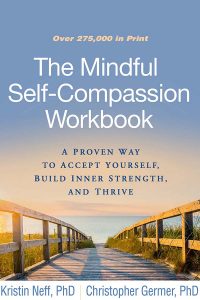
Is that a statement or is there a question there?
That was just a statement of reflection.
If you want to do the practice, we have something called the Mindful Self-Compassion Workbook. There are 40 actual practices and exercises that you can do to train yourself in the skill of self-compassion because it's not necessarily a natural way to be with itself. It's a habit we have to build.
I'm going to go get that right now. I'm going to work on that and I would be kind to myself. Kristin, thank you for being a guest here. I appreciate it.
I had a lot of fun. Thank you.
I want to thank you for tuning in. I hope this inspires you to reflect on your own mistakes, and how you can learn from them, or turn them into a positive. I've had people tell me they started being more open and honest about mistakes in their work, and they're trying to create a workplace culture where it's safe to speak up about problems because that leads to more improvement and better business results. If you have feedback or a story to share, you can email me at MyFavoriteMistakePodcast@gmail.com. Our website is MyFavoriteMistakePodcast.com.
Important Links
- Self-Compassion: The Proven Power Of Being Kind To Yourself
- Fierce Self-Compassion: How Women Can Harness Kindness To Speak Up, Claim Their Power, And Thrive
- Self-Compassion.org
- Daniel Pink – episode 137
- The Power Of Regrets
- Self-Compassion.org
- Mindful Self-Compassion Workbook
- MyFavoriteMistakePodcast@gmail.com
- Dr. Kristin Neff
- HBR – Self-Compassion Articles
- Self-Compassion Free Survey

